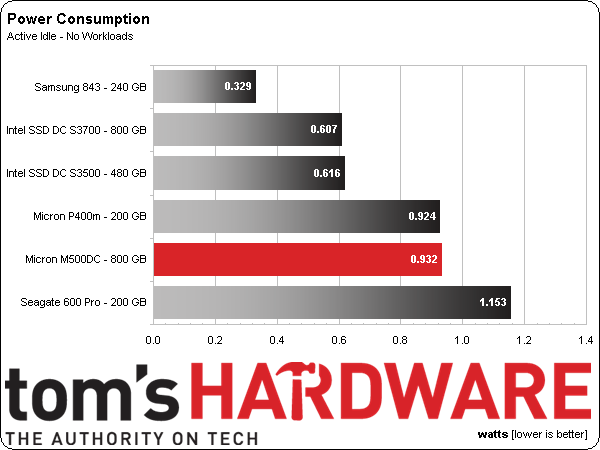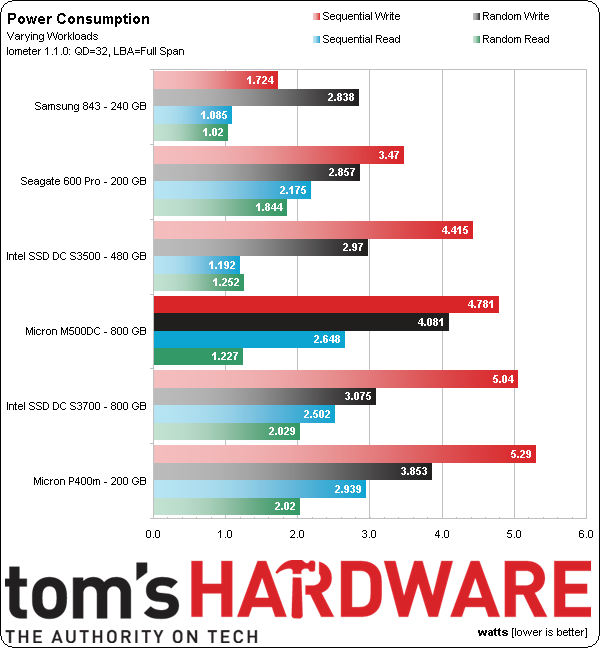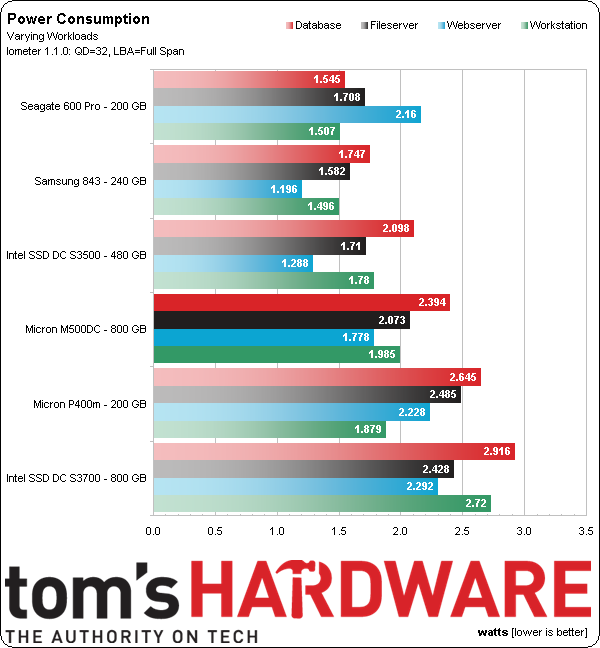Micron M500DC 800 GB SSD Review: Cloud And Web 2.0 Storage
Building on the desktop-oriented M500, Micron is announcing its enterprise-focused M500DC. We got a chance to run the 800 GB model through an updated test suite to gauge whether this Marvell-powered SSD keeps up with the best-known enterprise solutions.
Get Tom's Hardware's best news and in-depth reviews, straight to your inbox.
You are now subscribed
Your newsletter sign-up was successful
Results: Power Consumption
With a firm understanding of how our power testing works, let's check out the results. First up is Active Idle.
We're adding Samsung's 843 to the chart, since it's based on the notoriously frugal 840 Pro. Micron's M500DC hovers around 1 W through most of our measurement. That's roughly 50% higher than the two Intel drives and almost three times higher than the 843. There are IT professionals out there who like using enterprise storage in laptops and portable workstations. Due to its lack of DIPM and relatively high idle power, the M500DC would not be an ideal SSD for those on battery power, though.
A look at the power consumption from our sequential and random workloads shows the M500DC in the middle to high-end of the field. Unfortunately, the discipline where the M500DC excels, random write performance, is also where it draws a lot of power. Excluding the P400m, Micron's M500DC is over 1 W higher than the other SSDs in that test.
Once again, the M500DC is in the middle of the field. Granted, the SSDs we're testing include several different capacities, and fewer components in a drive mean less power consumption. So, it'd make sense that the M500DC and SSD DC S3700 are near the bottom. In an ideal world, all SSDs would be sampled in identical capacities to make comparisons easier. But that's just not the case.
Don't overlook the fact that Micron rates its M500DC at 6.2 W, and we were unable to push it past 5 W in any of our tests.
Get Tom's Hardware's best news and in-depth reviews, straight to your inbox.
Current page: Results: Power Consumption
Prev Page New: Power Consumption, Detailed Next Page Creating A New Mid-Range Enterprise Market-
ParrLeyne Good article/review!Reply
Only one _small_ problem. According to the Micron product page (http://www.micron.com/products/solid-state-storage/enterprise-sata-ssd/m500dc-enterprise-sata-ssd) the M500DC is a SATA device, not SAS! -
tripleX The author obviously does not understand the subject matter. SAS lumped in with SATA? read-centric SSD isnt meant for read workloads? etc. numerous errors, too many to list.Reply -
tripleX Author does not understand what "corner case" is. corner case testing? are you doing lab validation work?Reply -
drewriley In SSD testing, it is common to call the mix in testing between read/write and random/sequential as '4 corner' or 'corner case' testing. And yes, this is lab verification work, that is kind of the point of the review. Also, SAS and SATA do compete for applications. The point was to put different product that had similar specifications against one another.Reply -
tripleX Reply13279486 said:In SSD testing, it is common to call the mix in testing between read/write and random/sequential as '4 corner' or 'corner case' testing. And yes, this is lab verification work, that is kind of the point of the review. Also, SAS and SATA do compete for applications. The point was to put different product that had similar specifications against one another.
The fact you are claiming this is anything even remotely near lab validation exposes your tremendous lack of knowledge on the subject.
No one refers to 4-corner testing as corner case testing. One link to a reputable site that does so? Instead of arguing an indefensible point you should be attempting to learn exactly what corner case means. Most would have had the good sense to do that before posting.
SAS v SATA is like Formula 1 compared to Go-Karts. Another example of your lack of understanding. SAS is meant for users who require certain features, and the price demands that users are aware of those features. They do not compete against each other, they are two entirely different classes of hardware.
-
tripleX The fact you are claiming this is anything even remotely near lab validation exposes your tremendous lack of knowledge on the subject.Reply
No one refers to 4-corner testing as corner case testing. One link to a reputable site that does so? Instead of arguing an indefensible point you should be attempting to learn exactly what corner case means. Most would have had the good sense to do that before posting.
SAS v SATA is like Formula 1 compared to Go-Karts. Another example of your lack of understanding. SAS is meant for users who require certain features, and the price demands that users are aware of those features. They do not compete against each other, they are two entirely different classes of hardware.


